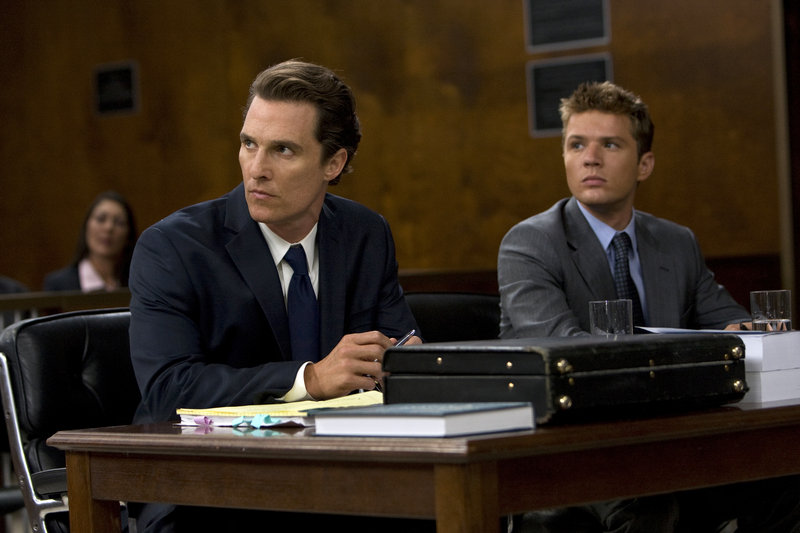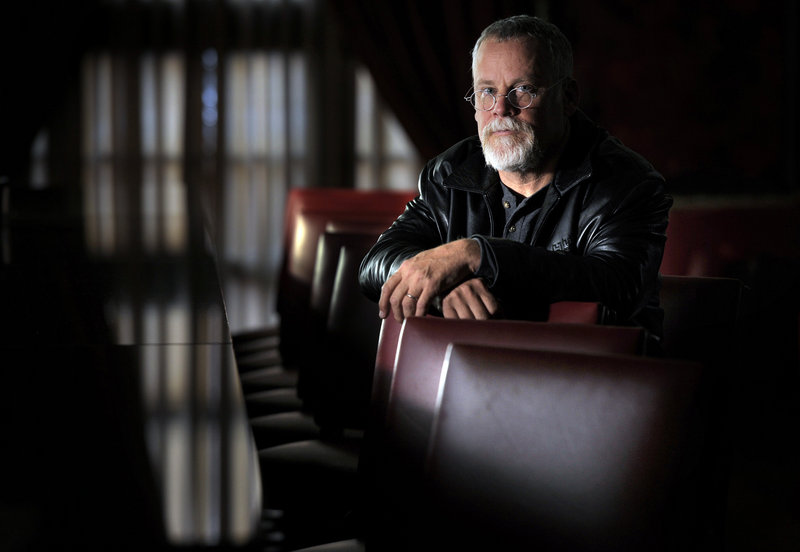WASHINGTON – Michael Connelly was a cops reporter for about a dozen years, most notably with the Los Angeles Times. He has sold 43 million of his 23 crime-based novels around the world since hanging up his press card nearly 20 years ago. Still, he has found some journalistic habits hard to break, such as researching the background of his thrillers.
With “The Lincoln Lawyer,” (Matthew McConaughey, Marisa Tomei, William H. Macy) now in theaters, the second of his books to make it onto celluloid, it turns out his crime fiction still draws heavily from fact.
“I hate revealing this stuff,” he says good-naturedly during a lunch conversation at the Ritz-Carlton in Georgetown recently while in town to promote the film. “I want people to think I’m a creative genius.” There’s plenty of creativity in the process, of course; it’s a trick of seeing things in the real world and “knowing what works, and where it works” in fiction.
He has figured out what works pretty well by now.
He’s 54, about 6 feet tall, with close-cropped hair, a full Vandyke beard and round, wire-frame glasses. He’s big-shouldered but soft-spoken. He lives with his wife, Linda, and a teen-age daughter, McCaleb, near Tampa. He has basketball season tickets for his alma mater, the University of Florida. He also has a 23-foot Boston whaler, which he likes to take out in the bay, where he fishes and thinks out plot development.
Connelly’s also got the one talent any reporter and writer has to have: an ear for a great story.
Writing “The Lincoln Lawyer” began a decade ago, on opening day at Dodger Stadium in 2001. A mutual friend brought along David Ogden, a criminal defense attorney. Connelly politely asked Ogden in which courthouse he most often worked. Ogden said, “Well, I pretty much work out of my car.” Connelly, the storyteller, knew then to be really interested.
“I drove a Lincoln Town Car or a Crown Vic,” Ogden, now retired and living in Montana, said in a phone interview. “It was a great thing. Some of it was show. It allowed me to make three or four “court” appearances every morning. And it made an impression on clients walking out of the courthouse, when this car would pull up and I’d get in.” Connelly loved this story, about how the Lincoln trunks were big and boxy enough to house filing cabinets. He loved that his driver was a former client, Lonnie Henderson, who’d spent a lot of time in prison before going straight.
Both men recall that Ogden, who felt slightly self-conscious about practicing law out of the back seat of a vehicle, volunteered to Connelly that day at the ballpark, as evidence of his success, that he lived a “couple of doors down from Matthew McConaughey.” (The lawyer and the actor had never met; that McConaughey wound up portraying Ogden on screen is happy coincidence.)
So Connelly had a premise — a defense lawyer working out of a Lincoln — but that wasn’t yet a story. He was concerned. He wrote about cops, most particularly Harry Bosch, an LAPD homicide detective, not lawyers. He thought John Grisham and Scott Turow, novelists who had been attorneys, knew their way around the courtroom drama a lot better than he did.
But he had always been intrigued with an attorney “doing the right thing at great risk to himself and his family” ever since reading “To Kill a Mockingbird,” as a kid in Fort Lauderdale.
So he kept on writing his Harry Bosch books but made a project out of researching a legal thriller. He moved from Los Angeles to Tampa and hooked up with Dan Daly, an old reporter buddy.
Daly had since gone into criminal defense law. He and partner Roger Mills had lots of stories to tell. The trio often would meet at a bar in Tampa called Four Green Fields, an Irish pub and a popular watering hole for prosecutors and defense attorneys, and they’d tell Connelly about the gritty way criminal law really worked.
Connelly asked during one of these sessions if they’d defended anybody really scary.
Daly quipped, “There is no client as scary as an innocent man.” It meant that you’d be haunted, as his attorney, if you couldn’t win the case.
“I didn’t take notes at these things, but that was so good I borrowed a pen and a cocktail napkin and got them to say it again so I could write it down,” Connelly says.
It became the epigraph of the book — and the key motivation for Connelly’s character, Mickey Haller, in a story filled with plot twists.
As the story developed on the page, Connelly based a good bit of Haller on Ogden’s style of work, but it wasn’t a character portrait. Haller is twice divorced (one of his exes is a prosecutor), a little bit too slick for his own good. His investigator is killed, and thugs threaten to kidnap his young daughter.
Ogden has been married for 45 years with two adult kids who never had a dramatic encounter with their dad’s clients. He’s also 66 and was delighted when producers picked the often-shirtless McConaughey for the role.
“I was worried they’d pick Wilford Brimley,” he says.
But the atmosphere for the story, the less-than-idealistic way the law tends to work, arose from stories that Ogden, Daly and Mills told Connelly, and he put them into print.
Like the story about a defense attorney who, if a client wasn’t paying him, would go to a hearing and tell the judge the case couldn’t proceed because he needed to find a “witness named Mr. Green” — as in cash. Another attorney would tell the judge he also needed a continuance (thus leaving his client in jail) because he had a “Rule No. 1 violation.” Rule No. 1 is that you get paid before you do any work.
Daly, now practicing in Gainesville, remembers that he once had a nonpaying client assure him that there wasn’t a problem, that he had Daly’s money.
“And I told him that was the problem,” Daly says. “He had my money.” The line made it into the movie, said by Haller to a client stuck in an L.A. County jail. Haller gets a hearing continued, leaving the client locked up, until he pays.
After three years of research, Connelly finally felt he was ready to push out the book. It was an immediate No. 1 bestseller.
“It was a very intelligent book, really solid in its reality and its law,” says Tom Rosenberg, chairman and chief executive of Lakeshore Entertainment, who bought the rights. “It had a great emotional impact, particularly between (Haller) and the character who is wrongly in the penitentiary.” That kind of near-gushing review has been the norm for Connelly’s work since he started out with “The Black Echo,” in 1992. He was still working at the L.A. Times, but “Echo” won the Edgar Award for best first novel from the Mystery Writers of America. It sold about 12,000 copies in hardcover — a promising start but nothing that would make you quit your day job.
Three years later, working on his fourth novel, he got a six-month leave from the paper. He realized he was writing much better with the free time.
“I went back because I had promised to, but I just couldn’t hack it anymore,” he says. “I went back for a month and then gave notice.” He and Linda had about two years’ salary in the bank, he says. She left her job in insurance to run the business end of his career. He has been writing at least a book a year since.
After lunch in Georgetown, he heads up to American University to give a talk to writing students. He tells them about the years of hard work involved, about how he builds a “series of obstacles” for his main character to work through, to build suspense and pacing. He says he tries to make his books involve some measure of redemption and reconciliation that resonates with readers.
“I can’t spend my life just writing puzzles and entertainments,” he says.
He still gets up at 5 a.m. most days, writes until 7 when he takes his daughter to school, comes back home and plows ahead into the early afternoon. Later, at night, he might write some more. He doesn’t use a desk these days, just sits on the couch and writes on a laptop. It works well: He has a new Mickey Haller booking coming out in April, “The Fifth Witness,” and a Harry Bosch book slated for the fall, “The Drop.”
“Mike does just does everything well,” says Otto Penzler, owner of the independent Mysterious Bookshop in New York. “The dialogue is so pure, and the plots are terrific. … I’ve seen an awful lot of writers thrilled to get that first book published, then they get a lot of success, and then they’re not that nice anymore. Mike’s just as nice today as he was on Day One.” Connelly wraps up the chat with the students. He’s heading back out on tour — a mere decade after hearing the story about an L.A. lawyer who worked out of his Lincoln.
Copy the Story LinkSend questions/comments to the editors.




Success. Please wait for the page to reload. If the page does not reload within 5 seconds, please refresh the page.
Enter your email and password to access comments.
Hi, to comment on stories you must . This profile is in addition to your subscription and website login.
Already have a commenting profile? .
Invalid username/password.
Please check your email to confirm and complete your registration.
Only subscribers are eligible to post comments. Please subscribe or login first for digital access. Here’s why.
Use the form below to reset your password. When you've submitted your account email, we will send an email with a reset code.